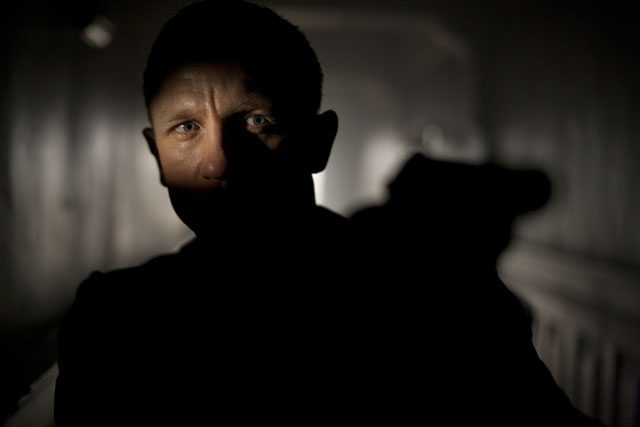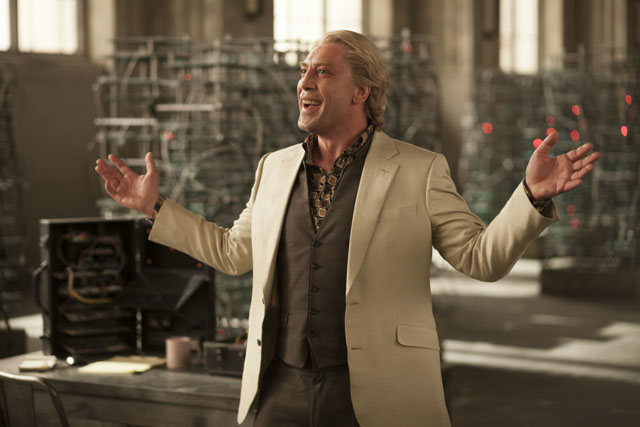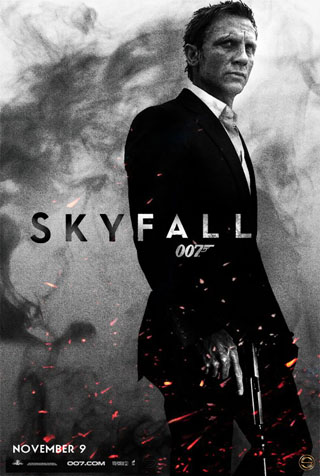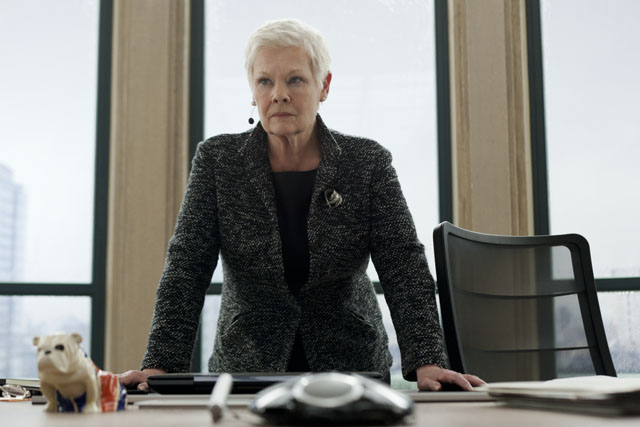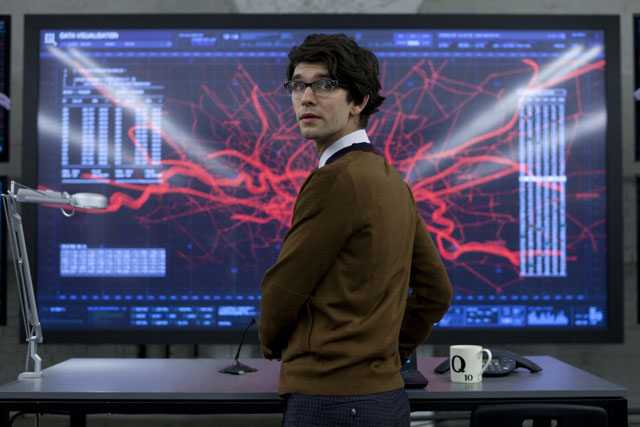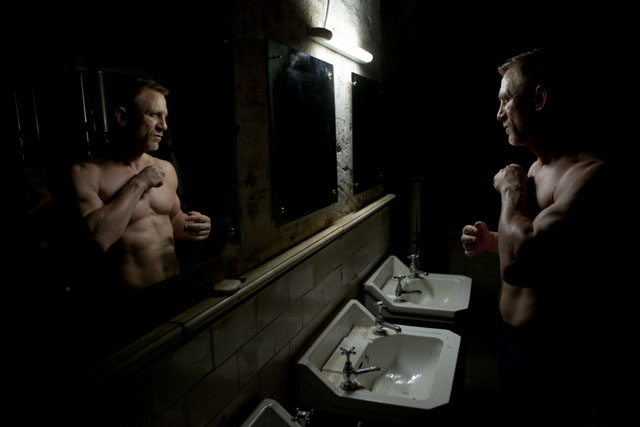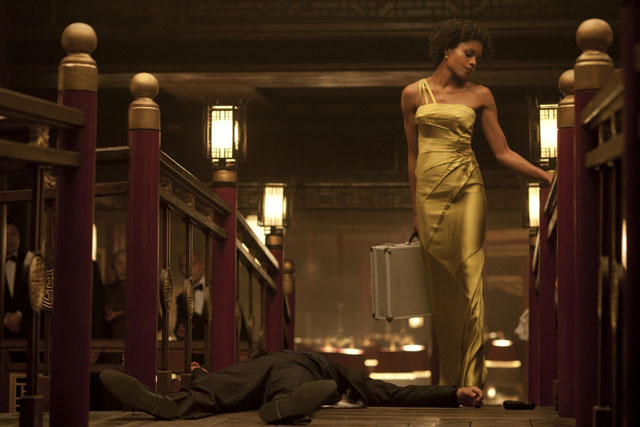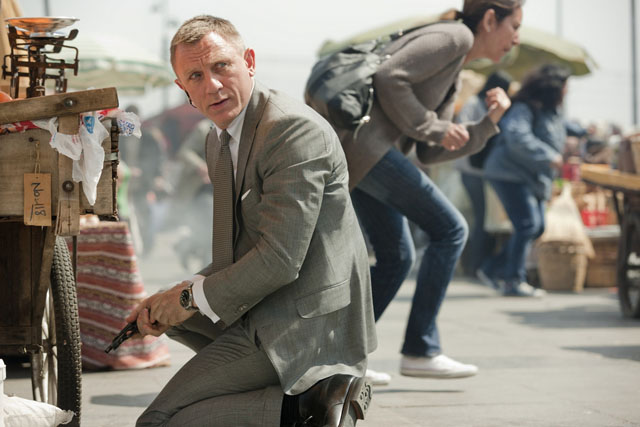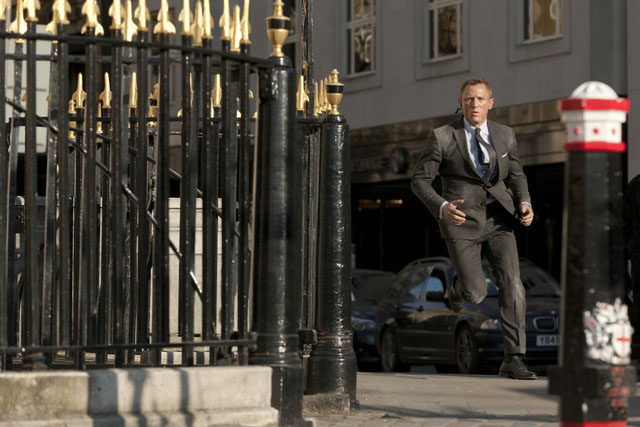There was an advance screening of Skyfall in London last night, and of course, the British papers and the American trades were there to catch it.
“It’s taken 23 films and 50 years to get Bond’s backstory, but the wait was worth it,” argues Variety‘s Peter Debruge. “In Sam Mendes’s hands, the franchise comes full circle, revealing the three-film Daniel Craig cycle to be both prelude and coda to the entire series via a foxy chess move that puts these pics on par with Christopher Nolan’s Dark Knight trilogy as best-case exemplars of what cinematic brands can achieve, resulting in a recipe for nothing short of world domination…. Whatever parallels it shares with the Bourne series or Nolan’s astonishingly realized Batman saga, Skyfall radically breaks from the Bond formula while still remaining true to its essential beats, presenting a rare case in which audiences can no longer anticipate each twist in advance. Without sacrificing action or overall energy, Mendes puts the actors at the forefront, exploring their marvelously complex emotional states in ways the franchise has never before dared.”
Nolan, adds the Playlist‘s Oliver Lyttelton, is, of course, “a big fan of the James Bond franchise. He said that he approached Batman Begins more like a Bond flick than a superhero movie, he directly nodded to one of 007’s high watermarks in Inception, and has publicly expressed interest in, at some point, directing one of the films in the franchise…. Sam Mendes has essentially made a Christopher Nolan Bond film before Christopher Nolan got the chance. That’s not quite fair to the American Beauty director, who makes his own mark on the series (and possibly his most satisfying film so far). But it’s also true that many of the qualities that Nolan brought to the Batman series are present and correct in Skyfall, both in the good and the bad.”
“How best to celebrate 50 golden years of the James Bond film franchise?” asks the Guardian‘s Xan Brooks. “Skyfall thinks it knows how: by laying out the bunting and putting on a show; by booking a delicious villain in Javier Bardem’s high-camp terrorist and arranging a glorious globe-hopping jaunt for the revellers. All of which works terrifically well up to a point. Except that Skyfall then falls prey to a common failing of many 50th birthday bashes: it allows sentimentality to cloud its judgment and loosen its tongue. In so doing, it risks blowing James Bond’s cover for good.”
“The story sees Bond in an emotional crisis after a failed mission to Istanbul leaves the names of secret agents in the hands of an unknown villain,” explains Time Out‘s Dave Calhoun. “Trips to Shanghai and Macau follow as Bond pulls himself together and tries to find the culprit for Judi Dench’s M and Ralph Fiennes’s Mallory, M’s Whitehall superior. There’s trouble at home, too, as a bomb explodes in the MI6 building in London and it becomes clear that M herself is under threat. Meanwhile, a delicious foe emerges in Silva (Javier Bardem), a camp, creepy and smooth character who dares to challenge Bond’s masculinity in an arresting scene in which his hands run up 007’s legs. The film’s many commercial sponsors can rest easy though: Craig’s harried, stern Bond is as inscrutable and wordless as ever.”
“Berenice Marlohe fills an evening dress and takes a shower with Bond, but—as has been the case since the larkish latter Roger Moore outings—the agent is relatively chaste here.” Kim Newman for Screen: “He has also given up smoking, though his dependence on drink and danger is probed in a manner that Ian Fleming might have grumbled about. For fifty years, Bond has been among the most buttoned-down of heroes, quipping after violent deaths and shrugging off any number of lovers, but here—drawing on elements of the novels—his background is hashed over, and he joins the ranks of heroes driven by the loss of his parents in traumatic circumstances at an early age. It may be that this baggage will be unhelpful for future installments, but at least it’s carried onscreen here with bearded charisma by Albert Finney, in a role that someone must have wanted to offer to Sean Connery, as a Bond family retainer with a handy shotgun and a laconic flair for the throwaway line that shows where the spy got that habit from.”
“Mendes is unafraid to let the quieter dramatic moments breathe,” writes the Telegraph‘s Robbie Collin, “and ace cinematographer Roger Deakins makes the wildly ambitious action sequences the most beautiful in Bond’s 50-year career.”
“Whereas Casino Royale tasted like a fine old vintage served in a snappy new bottle,” writes Todd McCarthy in the Hollywood Reporter, “Skyfall seems like a fresh blend altogether, one with some weight and complexity to it. Much of this, to be sure, stems from Mendes, who, with series veteran writers Neal Purvis and Robert Wade along with John Logan, yanks Bond, M and MI6 out of the world of colorful megalomaniacal villains and into the vexing world of shadowy terrorists and cyber warfare.”
Karen Krizanovich at the Arts Desk: “This could be the best Bond yet: light on sex, heavy on storytelling, hard on action.”
Updates: “One of the pleasures of Skyfall is the amount of screen time given to characters who in previous films have had only a marginal role,” writes Geoffrey Macnab in the Independent. “Dench’s M in particular is foregrounded. She’s at once a maternal figure and someone (we learn) who has behaved very ruthlessly towards her spies. Ralph Fiennes registers strongly as a bureaucratic type, breathing down her neck but with hidden reserves of courage. There is enjoyable banter, too, between Bond and Ben Whishaw’s very youthful but very boffin-like Q…. Craig again impresses as Bond. He switches without fuss from Roger Moore-style self-deprecating comedy (adjusting his cuff links in action sequences) to the darker, more intense scenes which focus on Bond’s childhood traumas.” What’s more, “the film ends with an emotional kick that you don’t often find in Bond. It also shows the way forward. At the age of 50, there is no sign at all that Bond is finished yet.”
Emma Brockes interviews Bardem for the Guardian.
Updates, 10/16: “Craig’s searing, stoic performance serves as a flinty counterpoint to Javier Bardem’s flamboyant turn as Silva,” writes Frank DiGiacomo at Movieline. “Bardem vaults into the pantheon of Bond villains by playing Silva as a bleach-blonde, computer savvy Anton Chigurh, who appears to have a thing for Bond. Even more remarkable, when Silva reveals this attraction to his bound former colleague by caressing his chest, 007 coolly alludes that it wouldn’t be the first time he’s gotten it on with a guy…. Skyfall has most of the familiar ingredients of Bond film: Beautiful women, intense action scenes, a charismatic villain and sleek cars—the Aston Martin DB5 makes a cameo appearance that will be talked about for a long time. The movie pointedly eschews the spy gadgetry of earlier Bond films to focus on human circuitry, and the pivotal surprises that the movie delivers in the final scenes pack a lot more wallop than the climactic explosions.”
“Skyfall’s attempts to bind the franchise’s cinematic legacy to a new type of James Bond—introspective, forward-looking (albeit begrudgingly), more politically and technologically astute—are admirable,” finds Adam Lee Davies, writing at Little White Lies. “While all of this sounds good in theory, only the remnants of those fine intentions have made it up onto the screen, with style, excitement, bombast, elegance and the sense of fun that has hallmarked the series all being reduced to martyrs of Bond’s new cause.”
Updates, 10/21: “Sam Mendes has said he would happily direct another James Bond film if Skyfall proves to be a hit with audiences,” reports the Guardian‘s Ben Child.
Salon‘s Andrew O’Hehir interviews Bardem.
Meantime, Steve Pankhurst posted a collection of James Bond book covers and Sahin Düzgün‘s designed his own poster for Skyfall.
Update, 10/24: For James Rocchi, writing for Box Office, “while director Sam Mendes, aided and abetted by a crack technical team, delivers big-screen action with panache and style, something about this Bond feels a little off…. [T]he climax, which finds Bond holed up in his old Bond family estate on the blasted heath of Scotland, feels—like the motivations—a little small. Bond is who you send when the world, not the workplace, is in peril, and watching Bond booby-trap his manor feels like a mash-up of Batman and Home Alone.”
Updates, 10/26: “This is the seventh time Judi Dench has played the enigmatic spy-chief M,” notes the Guardian‘s Peter Bradshaw. “But it is only in this storming new Bond movie that her M has really been all that she could be. Under the stylish direction of Sam Mendes, Dench’s M is quite simply the Bond girl to end all Bond girls. Watching this, I thought: of course. How could I have missed it? The real tension isn’t with Moneypenny, but with the boss herself. Now M is an imperious, subtly oedipal intelligence-matriarch with the double-O boys under her thumb. She’s treating them mean. She’s keeping them keen. And she is rewarded with passionate loyalty, varying with smouldering resentment…. The 50th anniversary of the big-screen Bond was the right time to pull off something big. Skyfall is a hugely enjoyable action spectacular.”
“It looks like Bond is in for the shock experienced by any child upon discovering that their mother had a life predating parenthood,” writes Ryan Gilbey in the New Statesman. “The final third of the film is taken up with Bond organizing what anyone with siblings will know is a luxury beyond compare: quality time alone with Mum. Bond even wheels out the Aston Martin DB5 in her honor. She’s his special girl.”
James Rampton talks with Ben Whishaw for the Telegraph.
Meantime, “Bond 24 is already in pre-pre-production and the plan is for it to start shooting at Pinewood Studios around this time next year and be ready for cinemas in the autumn of 2014,” reports Baz Bamigboye in the Daily Mail. “Screenwriter John Logan has been hired to write Bond 24, and he will pen it on his own. On Skyfall, he was brought in by director Sam Mendes and producers Michael G. Wilson and Barbara Broccoli to re-write the existing Skyfall screenplay that had been created by Neal Purvis and Robert Wade.”
Updates, 10/27: “Bond’s latest is a remarkable high watermark for the series: at once solemn and deeply funny, sexy and sad, self-conscious without all the rib-bruising elbowing.” John Semley for Slant: “Even more pertinent than its robust defense of the lost art of super-spying, Skyfall forcefully preserves Bond’s blockbuster birthright. It demonstrates that even a dusty, beat-up, archaic film series defined in no small part by its high glamor and corporate sponsorship can prove more relevant, and more importantly, enjoyable, than ever.”
Writing for the BFI, Henry K. Miller notes that “the franchise has long oscillated between the gargantuan—You Only Live Twice (1967), Moonraker (1979)—and the supposedly more sober—On Her Majesty’s Secret Service (1969), For Your Eyes Only (1981). Skyfall follows the pattern in reaction to the excessively pared-down, low-stakes and joke-free Quantum of Solace (2008). [Roger] Deakins’s camerawork, free of the Bournian cutting that beset Quantum, is the most striking instance of a general change.”
Tim Hayes in Critic’s Notebook: “Mr. Mendes, surely no less of a left-field choice than Marc Forster back in 2008, turns out to handle action with much more fluency and grace; at last the director’s empathy with Steven Spielberg and Richard Zanuck adds up. The hints of European reserve and eye for solid architecture that characterized Quantum are given the boot, in favor of all the lush fluid wash that digital filming and Planet Pinewood can offer.”
Updates, 10/28: The Observer‘s Philip French: “Though produced by children of the American who launched Dr. No, the Bond series is now a British institution with a global reach greater than our former empire, and the latest addition, Skyfall, was given its world premiere not in a movie house but at the Royal Albert Hall. In certain senses, it is more British than ever, not only in its predominant use of UK locations but in its relationship to national traditions. The patriotic opening ceremony of this summer’s Olympics sealed the pact between Buckingham Palace and showbusiness when the current Bond, Daniel Craig, was accompanied on a mission by the Queen, concluding with a parachute jump into the Olympic Stadium. It is now virtually impossible to look at Bond’s superior, M, as other than a stand-in for the Queen, especially as the regal Judi Dench came to the Bond series after impersonating Elizabeth I and Victoria. M seems now a code letter for majesty.”
Skyfall “puts fire back into the old formula,” writes Jonathan Romney in the Independent. “It takes the 007 legacy seriously, and gives us all the quintessential ingredients, without the coy self-mockery that dogged the series at its weakest. Here’s an intelligent, narratively propulsive Bond, the freshest, most entertaining episode in ages.”
Update, 10/31: FirstShowing‘s Alex Billington talks with Ben Whishaw.
Updates, 11/5: Skyfall “is the most overtly patriotic Bond film yet,” suggests the Economist. “[T]his Bond spends much of the film meditating on the sense of duty and love of country that inspired his work as a licensed killer. The puzzling question is quite which country that is.”
“Daniel Craig is amusingly single-minded,” finds the New Yorker‘s David Denby. “The earlier Bonds were superlative lovers of food, spirits, and women. As box-office has become truly internationalized, however, the producers may have feared that a too knowing Bond might not please everyone. Such a connoisseur could turn off moviegoers who object to the notion of being outclassed.”
“What is your favorite James Bond movie?” Matt Singer asks Criticwire contributors.
Skyfall‘s “breaking box office records worldwide,” reports Anne Thompson.
Updates, 11/7: “As a director of films like American Beauty and Away We Go, Mr. Mendes has indulged in a noxious blend of self-seriousness and condescension,” writes Manohla Dargis in the New York Times. “There’s none of that here. Instead he honors the contract that the Bond series made with its fans long ago and delivers the customary chases, pretty women and silky villainy along with the little and big bangs…. As Bond sprints from peril to pleasure, Mr. Craig and the other players… turn out to be the most spectacular of Mr. Mendes’s special effects.”
Glenn Kenny, writing at MSN Movies, agrees: “Although the movie has fun with its new, young and online-savvy Q (a very droll Ben Whishaw) and his gadget-minimizing directives, Skyfall shows once again the wisdom of Godard‘s dictum that all you need to make a movie is a girl and a gun. Or in this case a few girls, one of them an older one. For it is on M, so irritating at the movie’s opening and so poignant and admirable at its end, that Skyfall‘s fulcrum finally turns. And it is one of Dame Judi Dench’s finest hours. From her to Fiennes to Craig himself to Albert Finney, who turns up late in a role that could be his own ‘take that’ to Michael Caine, this is the best-acted Bond film ever.”
“Working with the great cinematographer Roger Deakins, Mendes also presents some stunning sequences of beauty in a film where you might not expect such a thing,” writes Alison Willmore at Movieline. “A fight high atop a Shanghai skyscraper takes place in the dark against the neon advertising backdrop of a shifting jellyfish projected on the building’s glass skin and ends with Bond meeting the gaze of someone in the building across the way, hundreds of feet up. Silva’s high-tech lair is set on an island that’s home to an abandoned city, while MI6 retreats with all its sleek gear to a historical location deep in London. The old and the new, the past and the ever-accelerating present—despite the body count, it’s not death that Bond has to worry about, it’s remaining recognizable and relevant. Skyfall manages to balance both in an uncommonly entertaining fashion.”
“Bond’s always been a rogue MI6 representative, but the implications of his contempt for authority cut deeper in a time of barely disclosed drone attacks and shadowy international law enforcement,” writes Vadim Rizov at GreenCine Daily. “Wrapping this kind of plea for unlimited authority in the British flag makes this plea even more old-school: taken to its logical limit, Skyfall would extend to an argument for recolonizing the Empire in the name of the greater good…. The finale finds Bond as lord of the Scottish manor, defending his territory from maniacal foreigners.”
More from Josef Braun and Ed Champion. At Criticwire, Matt Singer presents “a whole bunch of Bond rankings,” that is, “best Bond songs or girls or villains or gadgets” and so on, from all over. And FirstShowing‘s Alex Billington interviews Mendes (16’44”).
Updates, 11/11: Karina Longworth in the Voice: “Bond’s world is undeniably modeled after a real one engaged in debates about transparency and obfuscation, in which established institutions find themselves crippled (and, perhaps worse, rendered foolish) by stateless entities who show their power through violent interruptions of both the physical and virtual worlds. A bureaucrat played by Ralph Fiennes, trying to drag MI6 kicking and screaming into the age of Anonymous, contends that the agency ‘can’t keep working in the shadows—there are no shadows.’ … But as much as it’s open about its paranoia of the new, Skyfall‘s fatal misstep is its slavish hewing to event-movie trends. Like this summer’s Spider-Man, Batman, and Avengers movies, Skyfall seems to exist primarily to set up the events of subsequent films.”
“What we have here in the end is basically, almost literally, another reboot,” writes Jason Sperb. “Has Hollywood gotten so obsessed with rebooting franchises constantly that we now have a film series in James Bond which can boast two reboots in the last three (generally quite successful) movies?”
“This Bond installment is weighty with calculation,” writes the New Yorker‘s Richard Brody: “it feels like a ploy of demographically targeted marketing, with the personal drama attached to the espionage, the highly specific motives grafted to the thriller plot, looking like a studio decision to attract women viewers rather than like a mapping of any person’s imagination.”
“Fan service is familiarity that breeds contempt,” writes Sean Burns in the Philadelphia Weekly, “so when an otherwise compelling scene is interrupted just so Bond can fight Goldfinger’s Odd-Job in a kooky CGI lizard pit while reprising action beats from Live and Let Die, I began to feel like I was on a theme park ride…. Skyfall’s problems are the same that riddled The Dark Knight Rises. Much like the interminable amount of time spent waiting for Batman to become Batman again, we have already spent two movies wanting to see Daniel Craig finally become James Bond—and before the opening credits, they’ve knocked him out of commission. And then we have to start all over again.”
Slate‘s Dana Stevens finds Skyfall to be “an unexpectedly somber, even elegiac film.” For Salon‘s Andrew O’Hehir, it’s “a smashing entertainment, but also one that feels over-engineered and constrained by its origins.” But Roger Ebert declares it to be “a full-blooded, joyous, intelligent celebration of a beloved cultural icon.”
More from Ben Kenigsberg (Time Out Chicago, 3/5), Peter Keough (Boston Phoenix, 3/4), Richard Lawson (Atlantic Wire), Drew Lazor (Philadelphia City Paper, A-), Wesley Morris (Boston Globe, 2/4), Keith Phipps (AV Club, A-), Tom Shone (C+), Keith Uhlich (Time Out New York, 4/5), John Wildman (Film Comment), and Mike Wilmington (Movie City News).
Criticwire‘s Matt Singer writes up his favorite Bond movies: “Because we’re talking about 007 here—and because I couldn’t decide and literally spent an hour shuffling and reshuffling my list—let’s pick the seven best, instead of your typical five.”
Bond’s music alone “probably deserves a biography unto itself,” writes Colin Fleming for the Washington Post: “a snappy, efficient and gossip-heavy one such as The Music of James Bond by Jon Burlingame, a standby on the film-music beat.”
“On April 19, 2010, James Bond effectively died.” In the Hollywood Reporter, Stephen Galloway tells the story of how Daniel Craig brought Mendes and Bardem on board and salvaged Bond 23.
Updates, 11/12: John Logan, “a playwright by first trade, wrote screenplays for Gladiator, Hugo, Rango, Sweeney Todd, and Any Given Sunday, among others,” notes Ray Pride at Newcity Film, “but he and Mendes take advantage of their shared theatrical background. Extended tête-à-tête mano-a-manos between British actors of several generations—Daniel Craig, Judi Dench, Ralph Fiennes, Naomie Harris, Ben Whishaw, Albert Finney—take advantage of their performance skills. But individual setpieces are weighted with visual elements that draw from a theatrical vocabulary, such as Dench’s besorrowed M overlooking gray London at a picture window slashed with billions of cold tears, match-cut to a wounded Bond cascading over a waterfall like a spent package, as well as a martial arts duel in a disused floor of a Shanghai high-rise lit only by sky-high scrim of neon sculpture. High-art allusions bristle gainfully more of the sort of strokes and coups-de-theatre that would be used to extend the space of the stage, such as the bad guy held in a cage that makes him less Hannibal Lecter and more one of Francis Bacon’s screaming popes.”
“Mendes’s best-known film, American Beauty, wa

